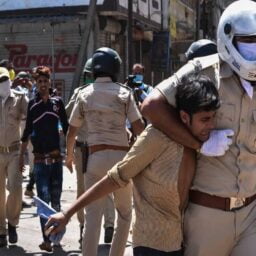INTRODUCTION
The Pandemic has given rise to the problem of lawful adoption for the majority of orphaned kids as a result of the pandemic, as well as protection for these abandoned kids involved in child trafficking and flesh trade. As an answer to widespread postings on digital media promoting children for adoption, the Ministry of Women and Child Development released a notification on their webpage for instructions as to how to safeguard those whose parents have died as a result of Covid-19.[1] Children who are abandoned and have no guardian must be placed in the nursery to be protected and nurtured until they find a home. PM Cares is one of the numerous initiatives run by the Federal Government, to assist these kids, as well as local governments also participate in welfare operations.
It is necessary to acknowledge how to legitimately adopt a child as well as after adoption succession rights that would accrue in the orphaned child. Adoption is governed by two statutes in India: “Juvenile Justice (Care and Protection of Children) Act, 2015 (JJ Act)”[2] and the “Hindu Adoptions and Maintenance Act, 1956.”[3]
Adoption is described as “voluntarily taking (a child of other parents) as one’s child, especially following formal legal formalities.” Adoption is a procedure where an individual assumes parental responsibility for another, permanently transferring all rights and obligations, as well as paternity through biological parent or parents.[4] Adoption has been a custom and practice in India since ancient times. Even though the process of adoption remains unchanged, the object for which it is being taken out and has modified. It ranged from a biological urge for a child as an object of attachment, a caregiver in old age, and a successor after death to a charitable purpose of looking for and nurturing an abandoned or underprivileged kid.
Adoption is illegal in India, according to the personal laws of Muslims, Christians, Parsis, and Jews. As a result, they frequently choose child guardianship’s under “Guardians and Wards Act of 1890.”[5] Residents of India who belongs to Hindus, Jains, Sikhs, or Buddhists are permitted to officially raise a child. The adoption is governed by the Hindu Adoption and Maintenance Act of 1956[6] that was enacted as a part of the Hindu Code Bills in India. It resulted in a few modifications to the adoption process that made it more flexible. Section 2(aa)[7] of the Juvenile Justice (Care and Protection of Children) Amendment Act of 2006 states that, “adoption means the process by which the adopted child is permanently separated from his biological parent and becomes the legitimate child of his adoptive parents, with all the rights, privileges, and responsibilities that come with the relationship.[8]”
Adoptive parents are limited to using just one statute for adoption. Nothing under Section 56 of the Juvenile Justice (Care and Protection of Children) Act, 2015 refers to adoptions done under the principles of the Hindu Adoption and Maintenance Act, 1956, as per Section 56(3).[9] This clause delineates the authority of the two statutes and prohibits conflict.
HINDU ADOPTION AND MAINTENANCE ACT, 1956[10]
The ability to adapt, the ability to donate in adoption, the impact of adoption, gender discrimination, and other concerns are all addressed in this Act.
Adoption Capacity: The Act states that any adult Hindu man of a sane mind can adopt a kid. If the aforementioned guy is wedded, his spouse’s approval is needed. Similarly, a Hindu woman of sane mind might consider adoption if the following conditions are met:
She is a divorced woman, a widow, or her husband has special needs, such as refusing to be a Hindu, given up on the world, or the court ruled that he is of unsound mind.
Only the parents or guardian has the legal power to place a child for adoption, according to Section 9[11] of this Act. If the mother has refused to be a Hindu, has deserted the world, or is of unsound mind, the father may give the child for adoption with the mother’s consent. If the father is passed away, has completely and permanently abandoned the world, has stopped being a Hindu, or has been pronounced insane by a court of competent jurisdiction, the mother may put the child for adoption.
Adoption has the effect of severing all connections between a child and his biological family once he is adopted. He inherits all of the rights and responsibilities of natural-born children.
The adoptive mother is the Hindu wife of an adoptive Hindu man. When more than one woman agrees to an adoption, the adoptive mother is the oldest in the couple, while the other women are referred to as stepmothers. All requirements concerning adoptive and/or stepparents are included in Sections 12, 13, and 14[12] of the Hindu Maintenance and Adoption Act of 1956.
Gender Bias in Adoption: Though it has been stated that gender discrimination has been eradicated since the Act’s introduction, it remains in practice. Even with her spouse’s permission, a wife cannot adopt until her spouse dies, becomes disabled, or revokes the world. But from the other side, a husband may adopt with his wife’s agreement.
The Juvenile Justice (Care and Protection of Children) Act of 2015 allows a partner or a single parent to adopt an orphan, abandoned, or surrendered kid. As per Section 38[13] of the Juvenile Justice (Care and Protection of Children) Act, 2015, the Child Welfare Committee must proclaim an orphan, abandoned, or surrendered (OAS) children legally available to adopt (Committee).
The Child Welfare Committee must declare legally free for the adoption of the group of children designated as “orphan” or “abandoned,” which includes social inquiry, tracing of biological parents, and a police report, and the legislation specifies a timeframe for completion of each of these steps. Following that, adoptive parents are subjected to a home study to determine their suitability for taking on the burden of adopting a kid, which is a lengthy procedure. Finally, the adoption is finalized once the court rules an adoption order.
In such a situation, the Risk of child trafficking increases:
These predicaments of such freshly abandoned kids have heightened interest in ‘adoption.’ However, there is a possibility of child exploitation, which typically takes the guise of social media posts soliciting kids for immediate adoption. Messages asking people to adopt orphans devastated by the Covid-19 outbreak have recently flooded social media platforms like Twitter and Facebook, as well as chat apps like WhatsApp. However, when government officials looked into these communications, they discovered that some of them were forgeries.[14]
CONCLUSION
Always adopt children legally for the sake of the child and the family’s well-being. If there is no formal adoption, the parents may face trafficking charges and a prison sentence, and the kid may be separated from them. To assist individuals in legally adopting children, you may call Childline at 1098 and report any orphaned or abandoned kid. Later on, specialized adoption organizations assist parents. Prospective Adoptive Parents (PAP) can also seek adoption assistance through the Central Adoption Resource Authority (CARA), a statutory entity of the Ministry of Women and Child Development. Aspiring Adoptive Parents will also be assisted by CARA in registering for adoption. CARA is responsible for monitoring and regulating both domestic and international adoptions. Later, Prospective Adoptive Parents will be expected to post their adoption application and supporting papers to CARA’s website. A social worker affiliated with the Specialized Adoption Agency will conduct a home study of PAP in preparation for the adoption procedure.
Author(s) Name: Divya Mishra (Student, Ramaiah Institute of Legal Studies, Bangalore)
References:
[1] Prachi Pallavi, Indian Adoption Laws: Endless wait for child orphaned during Pandemic, https://www.livelaw.in/columns/national-commission-for-protection-of-child-rights-ncpcr-covid-19-175647?infinitescroll=1, (last accessed June 26, 2021).
[2] The Juvenile Justice (Care and Protection of Children) Act, 2015, No. 2, Acts of Parliament, 2016.
[3] Ibid.
[4] Pragati Singh, Adoption laws in India, https://blog.ipleaders.in/all-you-need-to-know-about-child-adoption-laws-in-india/, (last accessed June 26, 2021).
[5] The Guardians and Wards Act, 1890, No. 8, Acts of Parliament, 1890.
[6] The Hindu Adoptions and Maintenance Act, 1956, No. 78, Acts of Parliament, 1956.
[7] The Juvenile Justice (Care and Protection of Children) Amendment Act, 2006, § 2(aa), No. 33, Acts of Parliament, 2006.
[8] Ibid.
[9] The Juvenile Justice (Care and Protection of Children) Act, 2015, § 56(3), No. 2, Acts of Parliament, 2016.
[10] Almas Shaikh, Legal framework governing Adoption laws in India, https://www.lawctopus.com/academike/legal-framework-governing-adoption-laws-india/, (last accessed June 26, 2021).
[11] The Hindu Adoptions and Maintenance Act, 1956, § 9, No. 78, Acts of Parliament, 1956.
[12] The Hindu Adoptions and Maintenance Act, 1956, § 12, 13, 14, No. 78, Acts of Parliament, 1956.
[13] The Juvenile Justice (Care and Protection of Children) Act, 2015, § 38, No. 2, Acts of Parliament, 2016.
[14] Akriti Anand, Covid-19 leaves Hundreds orphaned, https://www.indiatoday.in/coronavirus-outbreak/story/covid-19-leaves-hundreds-orphaned-how-you-can-help-and-what-you-should-know-about-adoption-1809769-2021-06-02, (last accessed June 26, 2021).
















